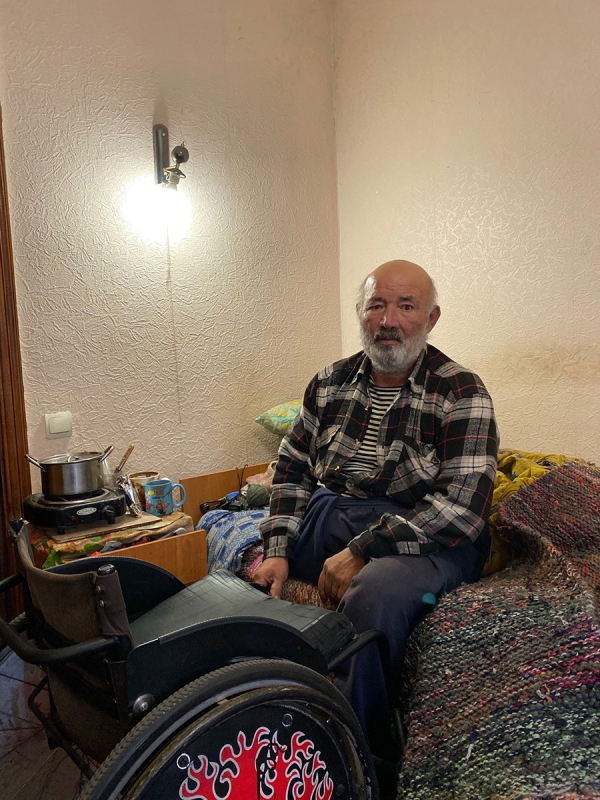On 16 March 2020, Human Rights Watch (HRW) published a report denouncing the consequences of conflicts for internally displaced people with disabilities in Easter Ukraine. The term internally displaced persons (IDPs) – according to the United Nations Guiding Principles on Internal Displacement – refers to "persons or groups of persons who have been forced or obliged to flee or to leave their homes or places of habitual residence, in particular as a result of or in order to avoid the effects of armed conflict, situations of generalized violence, violations of human rights or natural or human-made disasters, and who have not crossed an internationally recognized state border”. Due to their forced displacement, IDPs are inherently vulnerable to deprivation of adequate shelter, further displacement and other risks, such as lack of access to basic services, family separation, sexual and gender-based violence, trafficking or discrimination and harassment. The impact of those risks is greater on certain categories of people prone to vulnerabilities, including people with disabilities. Such a state of affairs has been present in Eastern Ukraine since the beginning of the conflict.
Since 2014, Eastern Ukraine has been affected by a war between the government forces and Russia-backed armed groups. The conflict has spread through the Donetsk and Luhansk regions and forced about 1.5 million people to flee to nearby cities and towns or to further Central, Western and Southern zones of the country. To respond to the challenges of the increasing internal displacement, local authorities in conflict-affected areas have employed existing facilities and structures such as churches, hotels and recreation centers, to accommodate people displaced by the conflict. These structures – initially conceived as temporary solutions - are ill-devised to adequately address the basic needs of the IDPs, especially of those with disabilities, who are inherently more vulnerable and, as such, face further challenges. Although their life is no longer in in immediate danger due to the hostilities, the UN aid agency’s overview of humanitarian needs in Eastern Ukraine suggests that 1.1 million older people and 416,000 people with disabilities are among the five groups bearing the heaviest burden of the conflict, emphasising the severe obstacles they have been facing in accessing basic services, structures and health care since the beginning of the war.
Firstly, since 2014, older people and people with disabilities have struggled during evacuation and were unable to decide on the place and mode of their relocation, which, despite the responsibility to protect IDPs belonging to national authorities, were carried out exclusively by NGOs and civil society organisations. Secondly, even inside the housing facilities, IDPs lacked and still lack adequate access to water, sanitation facilities, heating services, functioning elevators and accessible pathways, impeding their personal mobility. In addition to these physical challenges, they often experience stress and trauma originating from the chaotic evacuation process as well as the sudden detachment from their network, which has led some to also experience loneliness and isolation. Ultimately, access to basic services remains a real challenge. Not only do the IDPs struggle with easy access to medical care due to hospitals being located kilometers away with no accessible transportation available, but also are faced with a shortage of medical specialists. Further difficulties materialise when attempting to purchase medications or access quality healthcare due to long waiting times in case of emergency health situations. Similarly, while public transport is not wheelchair-accessible, the alternative modes of transport are too expensive, which undermines their ability to carry out daily activities independently. Finally, children with disabilities cannot access local schools and can only take part in education by having teachers come to the housing facilities.
The above issues affect more than 200 centers around the country, which offer assistance and shelter to displaced people. As a result, Human Rights Watch urged the Ukrainian government to fulfill their responsibilities under international humanitarian law to provide for the protection and humanitarian assistance of IDPs. Another focus of HRW was a government compliance with the provisions of the Convention on the Rights of Persons with Disabilities, which guarantees equal, fair and inclusive access to transport, basic health services, education and physical environment more broadly. Therefore, the first step suggested is to conduct consultations with the people affected to ensure that their basic rights and services are safeguarded in order to foster a right to respectable life for all, especially during a conflict.
To read more, visit:
https://www.hrw.org/news/2020/03/16/we-live-we-are-homeless
https://emergency.unhcr.org/entry/44826/idp-definition
Author: Camilla Lavino; Editor: Aleksandra Krol




